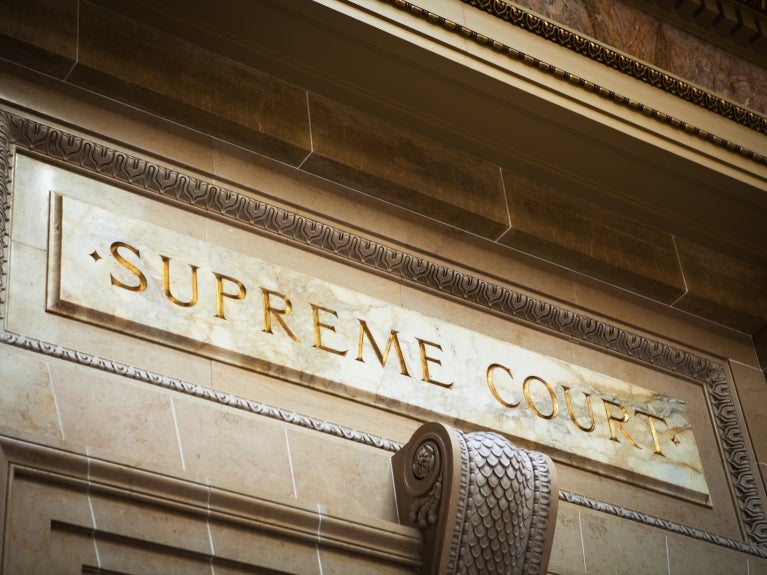Supreme Court To Review Critical Case on Deference to Administrative Agencies

Overview
The Supreme Court of the United States has agreed to review a case taking direct aim at "overregulation" by federal administrative agencies. Any client or business that routinely deals with federal administrative agencies, especially those that have experienced administrative overreach, should monitor the case and consider weighing in.
For nearly 40 years, judicial review of federal agency statutory interpretation has been governed by the Chevron doctrine derived from Chevron, U.S.A., Inc. v. Natural Resources Defense Council, Inc.[1]: if the statute is clear, then courts will apply the clear text; if it is "ambiguous," then the court will defer to a reasonable agency interpretation. Over the last 20 or more years, however, the Supreme Court has rolled back the broadest applications of that framework, and even stopped citing it in cases where it would apply. Some Justices have advocated for Chevron's reversal, describing it as an abdication to the executive branch of the core judicial responsibility to say what statutes mean. Until now, however, the core of Chevron has not been overruled. Lower courts are, therefore, still required to determine whether a statute administered by a federal agency is "clear" or "ambiguous," and if it is "ambiguous," to accept an agency's reasonable interpretation.
Earlier in May 2023, the Supreme Court granted a petition for a writ of certiorari filed on behalf of New England fishermen against the National Marine Fisheries Service. The petition expressly asked the Court to overrule Chevron, and the Court granted review on that question: "Whether the Court should overrule Chevron or at least clarify that statutory silence concerning controversial powers expressly but narrowly granted elsewhere in the statute does not constitute an ambiguity requiring deference to the agency." Clients can reasonably expect that this case will produce new law on when statutes should be considered "ambiguous" and when (if ever) courts should defer to federal agencies' interpretations of federal statutes. The case could be one of the most significant decisions regarding the relationship between the judiciary and the administrative state in the last 50 years, and any business subject to federal regulation or oversight should follow it closely.
Background
The case is Loper Bright Enterprises v. Raimondo, No. 22-451. A divided panel of the U.S. Court of Appeals for the District of Columbia Circuit, in an opinion by Judge Judith Rogers joined by Judge Sri Srinivasan and over a dissent by Judge Justin Walker, affirmed a district court decision upholding a regulation by the National Marine Fisheries Service (NMFS) that required New England fishermen to fund the salaries of government monitors onboard their fishing vessels.[2] The governing statute is the Magnuson-Stevens Fishery Conservation and Management Act of 1976, 16 U.S.C. §§ 1801–1884. It requires fishermen to "carry" monitors onboard so that compliance with fishing quotas and regulations can be observed. It also expressly authorizes various fees and penalties related to the Northwest Fishing Council and foreign fishermen. But the regulation at issue applied to New England fishermen and imposed significantly steeper compensation requirements than the express statutory provisions imposed elsewhere. The agency argued that the vague authority to undertake "necessary" or "appropriate" measures was an "ambiguity" that it had reasonably interpreted to force fishermen to pay salaries for federal monitoring.
The D.C. Circuit began by noting that the "major questions" doctrine did not apply. Most recently in West Virginia v. EPA, the Supreme Court has reiterated that it will not blithely assume that Congress has impliedly given a federal agency extraordinary authority over significant economic or political questions.[3] Congress must expressly delegate such a power to the agency for courts to recognize it. But the D.C. Circuit contrasted those situations with the fisheries regulation because "Congress has delegated broad authority to an agency with expertise and experience within a specific industry, and the agency action is so confined, claiming no broader power to regulate the national economy."[4] And with that hurdle cleared, the majority turned to "the familiar two-step Chevron framework."[5] It viewed the statute as ambiguous largely because of its silence as to the precise question at issue―whether regulated fishermen can be forced to pay for federal monitors. And it viewed the agency's scheme as a reasonable exercise of the agency's authority.
The dissent, by contrast, viewed the statute as unambiguously not giving the agency the authority it claimed, and it emphasized that "Congress's silence on a given issue does not automatically create such ambiguity or give an agency carte blanche to speak in Congress's place. In fact, all else equal, silence indicates a lack of authority."[6]
The Petition for Certiorari
The fishermen's certiorari petition raised two questions. The first was "[w]hether, under a proper application of Chevron, the [statute] implicitly grants NMFS the power to force domestic vessels to pay the salaries of the monitors they must carry." The second question, quoted at the outset of this Update, was whether Chevron should be overruled or significantly restricted where a statute is silent on the question at issue. The petition is colored throughout with depictions of a runaway administrative state, "exponential growth of the Code of Federal Regulations and overregulation by unaccountable agencies," and the need for "bulwarks of the citizenry against overregulation."
On May 1, the Supreme Court granted the petition but only as to question 2―the Chevron question. Justice Ketanji Brown Jackson is recused from the case because she had been on the original panel for the D.C. Circuit case before being nominated to the Supreme Court.
Analysis
This is a very significant case for any federally regulated entity, and there is ample reason to believe that the Court will make significant changes to the doctrine of "Chevron deference." Several Justices have criticized or sought to limit Chevron deference in recent years. In 2015, Justice Clarence Thomas wrote that Chevron "wrests from Courts the ultimate interpretative authority to 'say what the law is'" and instead gives it to the executive branch.[7] Justice Neil Gorsuch has written that "the aggressive reading of Chevron has more or less fallen into desuetude—the government rarely invokes it, and courts even more rarely rely upon it," but "the whole project deserves a tombstone no one can miss."[8] Chief Justice John Roberts has embraced the "major questions" limitation on Chevron, declining to accept an implicit delegation of authority on any "question of deep economic and political significance that is central to [the] statutory scheme" and assuming instead that "had Congress wished to assign that question to an agency, it surely would have done so expressly."[9] Justice Samuel Alito has observed that Chevron resulted in "a massive shift of lawmaking from the elected representatives of the people to unelected bureaucrats."[10] Justice Brett Kavanaugh has also written in favor of "preserv[ing] the separation of powers" and "vital check[s] on expansive and aggressive assertions of executive authority."[11] Elsewhere, he has written that Chevron's command that reviewing courts "must exhaust all the traditional tools of construction before concluding that an agency rule is ambiguous" means that Chevron, if properly applied, should be relatively inconsequential: "the court will almost always reach a conclusion about the best interpretation."[12]
Those comments, if viewed as likely votes for altering the prevailing approach to Chevron, translate into a majority of the Supreme Court. And the government likely faces an even more uphill climb to preserve Chevron given the absence of Justice Jackson. Even if the Court does not undertake radical surgery on Chevron deference, there is ample need for clarification of its core concepts, such as what makes for "ambiguity" and how to understand statutory silence. The certiorari petition cites significant disarray as to those core concepts. Notwithstanding Justice Kavanaugh's admonition that, under Chevron itself, the traditional tools of statutory interpretation should almost always provide the answer, legal scholars have surveyed samples of more than 1,000 cases and found courts declaring "ambiguity" in the statutory text approximately 70% of the time.[13] And while some courts or judges might consistently decline to find ambiguity in the statutory text, the wide variance in the first step of Chevron analysis has led to inconsistent applications across jurisdictions.
But the theme of the Loper Bright certiorari petition is not improving the technocratic operation of an administrative law doctrine. It aims squarely at what it claims to be overregulation by a runaway federal bureaucracy that the public should care about deeply. There is every reason to think that a majority of the Supreme Court will share those same concerns, informed by nearly 40 years of increasing Executive Branch resort to agencies―instead of Congress―for the most significant policymaking. And unlike cases touching the "major questions" doctrine, this case has the potential to affect interactions with federal agencies at the most granular level.
Any person or company that confronts federal agencies interpreting and applying federal statutes may come away from this case with new grounds for a challenge. Furthermore, any person or company who wants to bring to the Court's attention an egregious overreach by a federal agency should consider supporting an amicus curiae brief to provide the Court with examples. As of this writing, amicus curiae briefs in Loper Bright in support of the challengers to Chevron are due on June 22, 2023.
Chevron said that "if the statute is silent or ambiguous with respect to the specific issue, the question for the court is whether the agency's answer is based on a permissible construction of the statute."[14] Now that the Supreme Court has granted review in Loper Bright, the days of statutory silence signaling an implied delegation of authority to the agency may be numbered, and the ease and permissibility of finding statutory ambiguity may be drastically reduced.
Endnotes
[2] 45 F.4th 359, 363 (D.C. Cir. 2022).
[4] Loper Bright, 45 F.4th at 365.
[6] Id. at 374 (Walker, J., dissenting).
[7] Michigan v. EPA, 576 U.S. 743, 761 (2015) (Thomas, J., concurring) (citation omitted).
[8] Buffington v. McDonough, 143 S. Ct. 14, 22 (2022) (Gorsuch, J., dissenting from denial of certiorari).
[9] King v. Burwell, 576 U.S. 473, 485–86 (2015) (citation and internal quotations omitted).
[10] Justice Samuel Alito's remarks at the Claremont Institute, 02.11.2017; see also Deference and its Discontents: Will the Supreme Court Overrule Chevron?, Congressional Research Service 4 (Oct. 11, 2018).
[11] United States Telecom Ass'n v. Fed. Commc'ns Comm'n, 855 F.3d 381, 417 (D.C. Cir. 2017) (Kavanaugh, J., dissenting from the denial of rehearing en banc).
[12] Kisor v. Wilkie, 139 S. Ct. 2400, 2448 (2019) (Kavanaugh, J., concurring) (citation and internal quotation marks omitted).
[13] See Kent Barnett & Christopher J. Walker, Chevron in the Circuit Courts, 116 Mich. L. Rev. 1, 33–34 (2017).
[14] 467 U.S. at 843 (emphasis added).
© 2023 Perkins Coie LLP

